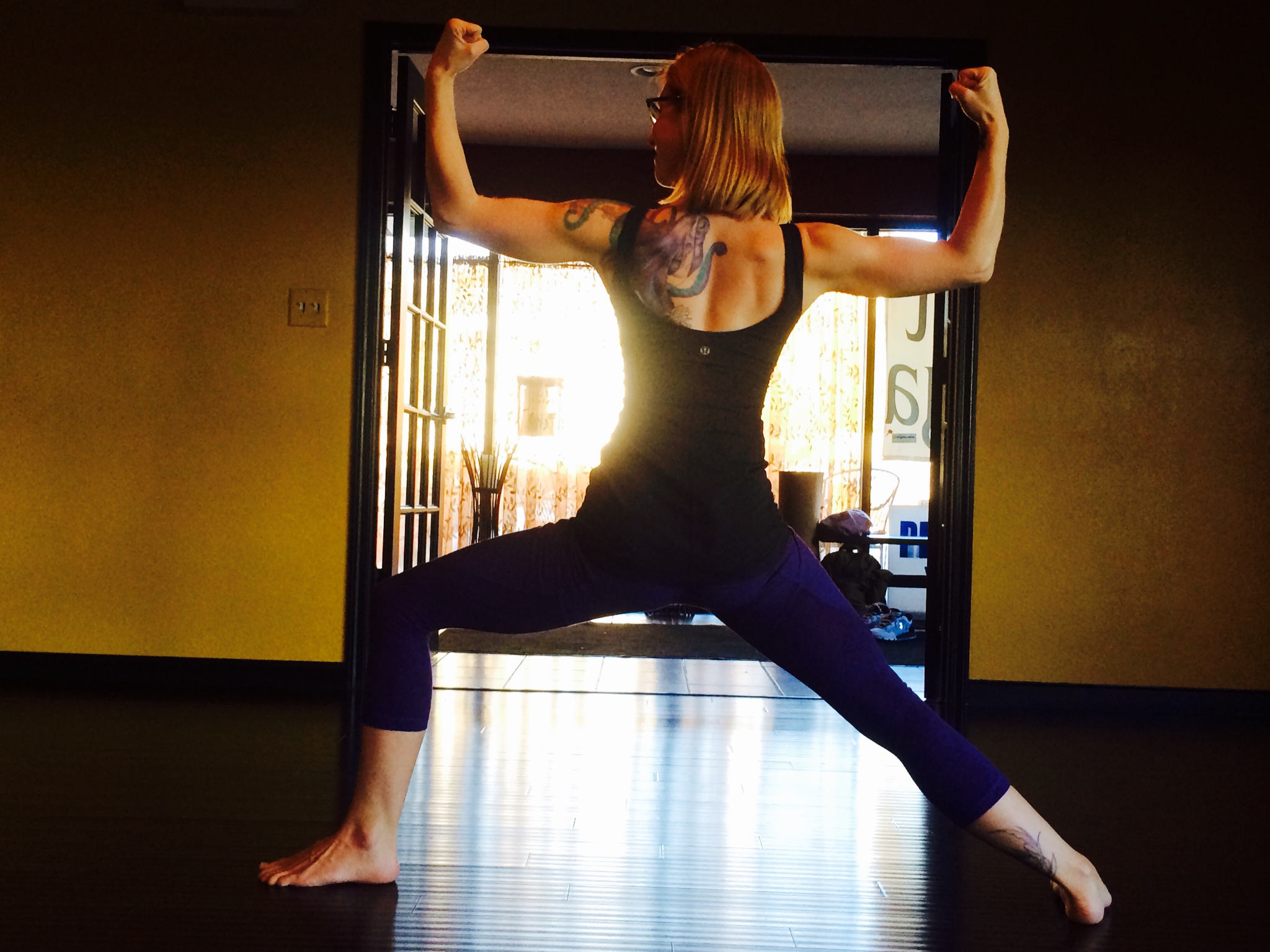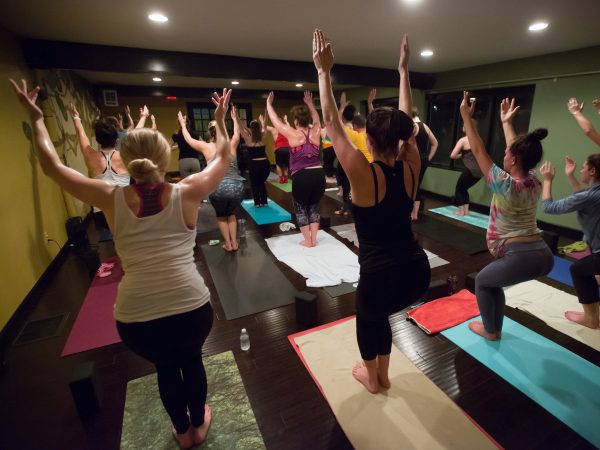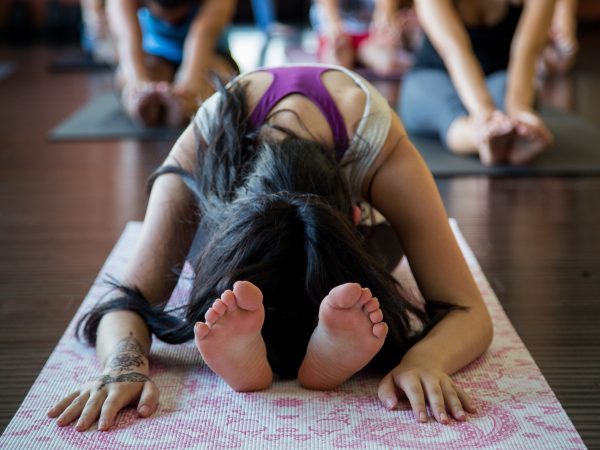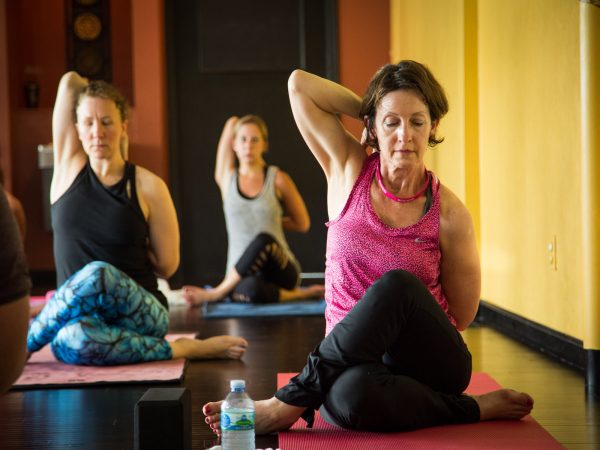My Yoga is Feminist

Sixteen years ago, I walked into a yoga studio for the first time. I carried with me, a mat I borrowed from my mom, and a body from which I was even more separated. At sixteen, I had been teased, tormented, and taken by more than one person. I was convinced that the pain I felt in my heart was my flesh’s fault. More than your average teenage angst, I oozed self loathing.
I vaguely remember my first class. What I do remember is I went back. And a few months in, my yoga teacher was egging me on in every challenging moment. One day, while my arms quaked during chaturanga dandasana, she crouched next to me and said, “You are young. You are strong. You can do this.” And I could. And I did. And I still do.
My yoga gave me my body back. Yoga told me my body, my choice. I can choose to work hard, or to take child’s pose. I can choose modifications and intensifications. Deep connection to my breath and the sensations of my body empowers me to make the right choices for my being during practice and in my life. Eventually, I stopped blaming my muscles, and curves, for the nastiness of others. Yoga taught me that my body was a temple, and it housed not only the dark corners of my soul, but the the light of the entire universe.
Almost every time I practice, I start in Balasana, commonly translated to “Child’s Pose.” But I did some translating. The prefix “Bal” does not directly translate to child. It means strength and power. When I practice, I do not drop to my knees and become childlike. I turn myself inward and tap into my strength. That strength carries with me as I flow through every sun salutation, lifting my spirit to forces that are greater than me, realizing breath after breath, that same force is within me.
Yoga tells us to unapologetically take up space, dig deeper, lift up your heart, your vulnerability, and your power. Yoga is the anti-oppressor. It is my liberator. When I practice, I become the radiant light of the sun, a powerful warrior, a rooted tree. When I practice, I flow like water, oozing femininity. My practice is as vital as water, as strong as a river, as deep as the ocean. My yoga is feminist.
Yoga wasn’t always feminist. It took a long time to get here. It used to be, like so many other things, a “boys club.” It was handed down from privileged man to privileged boy for generations. But women saw the power in this practice. Women fought for the right to practice. And we won. In the United States, the practice is saturated with women. The word yoga means “to yoke.” Yoga seeks to make one, body, mind, and soul. And as we breathe together in class, our pranas intermix and we too become one. Yoga does not seek to hold one gender, nor one body, over another. It is a great equalizer, as is true feminism.
My yoga is righteously feminist. It sweats away sexism. It does not care if I have makeup on, or shaved my legs. When I practice I shed away the layers of labels. I can be as big as I need to be. I can be as strong as I want to be. I can own every inch of my flesh and know that it is mine to love and mine to give. I can go deeper than blood and muscles, tap into the echoing ebb and flow of my ujjayi, and expand into the prana that surrounds and fill every single person.
Yoga helped me realize my femininity, when I started to feel pretty as I glistened with sweat. Yoga helped me realize my feminine strength as I bore three screaming children into the world. Yoga taught me to plant my feet firmly and not be disheartened if I sway a bit. I can stand up for the love in my heart. I can stand up for others, because I feel rooted to myself, and to everything else.
My yoga is unapologetically feminist. I do not have to ask anyone’s permission to change a pose to fit my body. I do not have to feel guilty if I am stronger than anyone else. I do not have to look down on myself, if my poses are not as perfect as someone else’s. I have to space to be myself. I can break down walls within my soul and in society. Yoga has given me the might to endure my most challenging moments both on and off of my mat.
Sixteen years after my first class, I do not have to borrow my mom’s mat anymore. I know, without a doubt, how deeply connected I am with my body. When I feel a weight on my shoulders, I bring it to my mat. Before yoga, that same weight that would crush me, now I can carry it. I bring everything with me to my practice. The things that I am ready to drop, I let go. But the others, things that are stuck or that I am not ready to be separated from, I find the strength to hold. Yoga is both the strength to lay down your weapons, and to lift your voice. It is the ability to connect to everyone, and the power to stand up for yourself. Yoga is feminist.




